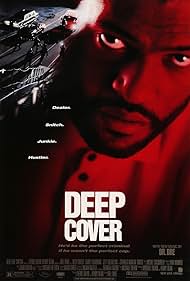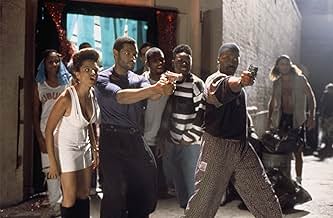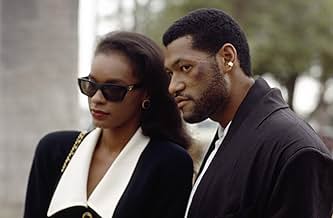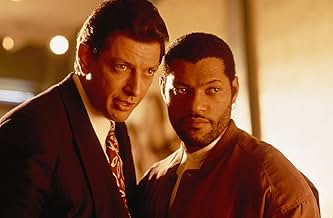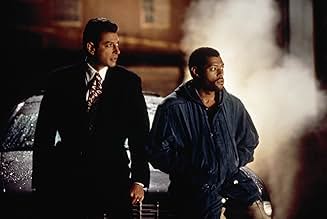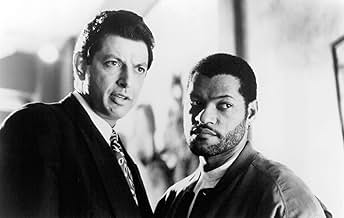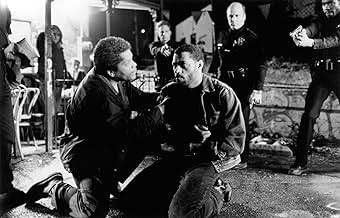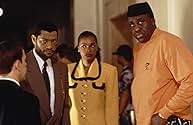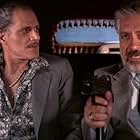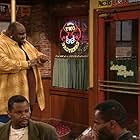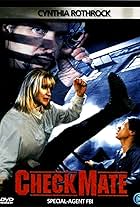A uniformed police officer is recruited by the DEA to infiltrate a drug smuggling ring looking to expand its operation.A uniformed police officer is recruited by the DEA to infiltrate a drug smuggling ring looking to expand its operation.A uniformed police officer is recruited by the DEA to infiltrate a drug smuggling ring looking to expand its operation.
- Awards
- 5 nominations total
- Russell Stevens Jr.
- (as Larry Fishburne)
- …
- Policeman
- (as Bruce Barbour)
- Molto
- (as Alex Colón)
Featured reviews
Traumatised as a youngster by the death of his junkie father, Russell Stevens (Fishburne) becomes a police officer. Passing an interview with DEA Agent Gerald Carver (Smith), Stevens goes undercover to bust a major drug gang that has links to high places. But the closer he gets in with the targets, the deeper he gets involved - emotionally and psychologically.
A splendid slice of gritty neo-noir, Deep Cover follows a classic film noir theme of a man descending into a world he really shouldn't be part of. This is a shifty and grungy Los Angeles, awash with blood money, single parents prepared to sell their kids, where kids in their early teens mule for the dealers and get killed in the process. A place of dimly lighted bars and pool halls, of dank streets and scrap yards, and of course of violence and misery.
The look and tone of the picture is as intense as the characterisations on show. Duke (A Rage in Harlem) knows some tricks to imbue psychological distortion, canted angles, step-print framing, slow angled lensing, jump cuts and sweaty close ups. Bazelli photographs with a deliberate urban feel, making red prominent and black a lurking menace. While the musical accompaniments flit in between hip-hop thunder and jazzy blues lightning.
Fishburne provides a narration that works exceptionally well, harking back to classic noirs of yesteryear. As this grim tale unfolds, his distressingly down-beat tone goes hand in hand with the narrative's sharp edges. The screenplay is always smart and cutting, mixing political hog-wash and social commentary with the harsh realities of lives dominated by drugs - the users - the sellers - the cartel, and the cop going deeper underground...
Great performances from the leading players seal the deal here (Goldblum is not miscast he's the perfect opposite foil for Fishburne's broody fire), and while some clichés are within the play, the production as mounted, with the narrative devices of identification destruction (hello 2 masks) and that violence begets violence, marks this out as one the neo-noir crowd should note down as a must see. 8/10
On the one hand, there's Russel, the cop determined to make a difference in his community who is then taken advantage of by his superiors and used like a tool. Russel begins demonstrating more and more criminal traits as the film goes on, eventually "becoming" his undercover alter ego John. As a criminal, John is able to do exactly what he set out to do, all while commanding respect and receiving tons of money without any of the red tape he had as a cop. In the end, he has to make a choice, cop or criminal. Work with society and be dishonest to yourself, or work outside of society and be dishonest to "the system".
On the other hand, there's David, a lawyer with a nice wife, house, and kid, but also happens to be a major drug dealer. He too must make the same difficult choice, even stating in the film, "I want my cake and eat it too", which truthfully shows that it is a hard decision.
While Deep Cover is labeled by most as a "hood movie", it is quite different in it's themes from most films in that genre. Instead of simply presenting the inner cities' problems, the filmmakers here try to answer the question of why. Why do young people feel the need to become criminals? Perhaps it's because of the bureaucratic nature of a society that turns it's back on those with strong uncompromising individuality coupled with low income. Maybe not. But unlike most films that answer all the questions they present for their audiences, Deep Cover simply asks the questions, and leaves the answers up to its audience.
The filmmaking here is intelligent, the subject matter is interesting, and the audience is treated with an amount of respect that isn't easy to find in modern film. No, the film isn't perfect, but at least in my eyes, it's very close to being so.
Did you know
- TriviaThe last film where Laurence Fishburne was credited as Larry.
- GoofsWhen Carver is reviewing Stevens' police personnel file, it shows he is divorced, and the reason is shown as "Infedility"
- Quotes
John Hull: We took eleven million in drug profits out of the van. The money doesn't know where it comes from, but I do. If I keep it, I'm a criminal. If I give it to the government, I'm a fool. If I try and do some good with it, maybe it just makes things worse. Either way, I'll probably just wind up getting myself in more trouble. It's an impossible choice, but in a way, we all have to make it. What would you do?
- SoundtracksDeep Cover
Performed by Dr. Dre
Introducing Snoop Dogg (as Snoop Doggy Dogg)
by Dr. Dre, Colin Wolfe
Courtesy of Death Row Records
Details
- Release date
- Country of origin
- Language
- Also known as
- La cara sucia de la ley
- Filming locations
- Los Angeles, California, USA(Location)
- Production companies
- See more company credits at IMDbPro
Box office
- Budget
- $8,000,000 (estimated)
- Gross US & Canada
- $16,639,799
- Opening weekend US & Canada
- $3,451,356
- Apr 19, 1992
- Gross worldwide
- $16,639,799
- Runtime1 hour 47 minutes
- Color
- Sound mix
- Aspect ratio
- 1.85 : 1
Contribute to this page

